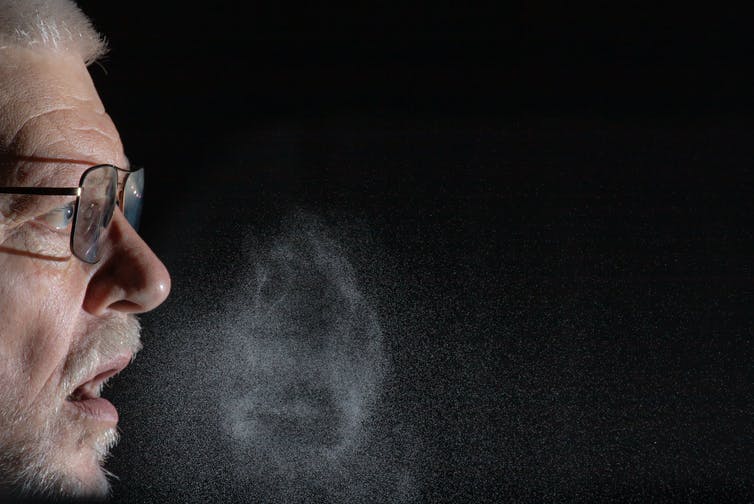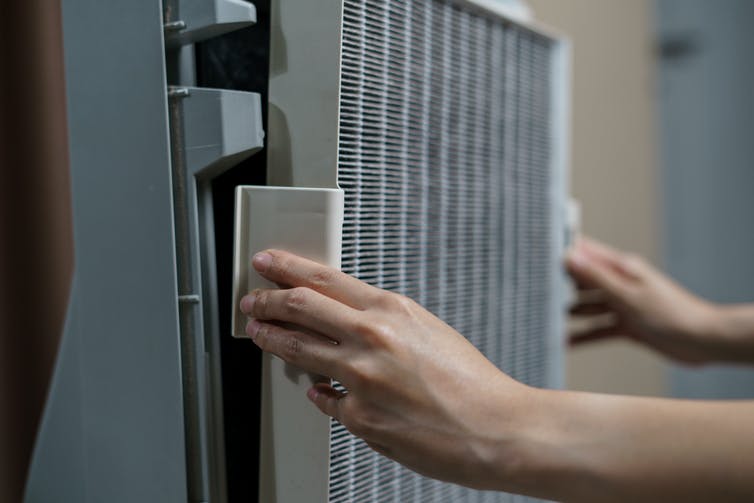
Alexandros Michailidis/Shutterstock
Hospitals are there to help sick people get better, but they can also be an infection risk. During the pandemic, many healthcare workers have caught COVID from patients they’ve been treating. Non-COVID patients have also picked up the virus while in hospital.
In non-pandemic times, patients with highly contagious respiratory infections are managed in specialised isolation facilities. These are single-person rooms with enhanced ventilation to prevent infectious particles from building up and spreading.
But during the pandemic the number of patients hospitalised with COVID has often overwhelmed these isolation units. Patients have had to be managed in wards not designed for people with infectious respiratory illnesses. This led our team in Cambridge to look at how to make these impromptu infectious disease units safer.
Extracting aerosols
A respiratory virus spreads by three different routes. Very small respiratory droplets that contain the virus, called aerosols, can be suspended in the air, for instance after talking. The virus can also be spread through larger droplets more often expelled through coughing or sneezing, which fall out of the air and on to things (including other people). Finally, viruses can also be picked up from contaminated surfaces (known as fomites).

Rainer Fuhrmann/Shutterstock
Since the beginning of the pandemic, debate has raged over the dominant route by which the coronavirus spreads. At the start, many authorities maintained that COVID was spread only by larger droplets and fomites, although the reasons for this insistence remain contentious. Some suspect this was informed more by global shortages of respirators than scientific data.
But it’s increasingly been acknowledged that aerosol particles are a major route of transmission. One indicator is asymptomatic patients. We know they can pass on the virus, but they don’t tend to produce larger droplets through coughing or sneezing – only aerosols.
With this in mind, our team deployed air-cleaning units that filtered the impromptu wards’ air through very fine filters, in an attempt to rid it of any lingering aerosols containing the coronavirus. These devices, called high-efficiency particulate absorbing (HEPA) filters, have been around since the 1940s. But despite long being used in hospitals, prior to this study there was limited data on their performance in health settings. Partially this was because of the difficulty of running ethical controlled trials of their effects on the spread of disease.
We used very sensitive tests to detect what bacteria, viruses and fungi were in the air in the impromptu wards the week before the experiment began. The results were striking. The coronavirus was detected every day before the filter was used. But when the filter was turned on, the virus could no longer be detected across the following week.
Then, with the filter again switched off in the third week, the virus was detected again. As well as getting rid of the coronavirus, we found that the HEPA filters also substantially reduced the amount of other bacteria, viruses and fungi in the air, which may also contribute to infection.
As well as running tests in regular makeshift COVID wards, the team also installed and tested HEPA filters in a ward repurposed as an intensive care unit (ICU), which was managing patients most unwell with COVID.

MBLifestyle/Shutterstock
Here, the team made a surprising discovery. In contrast to the regular makeshift ward, there was much less of the coronavirus in the air initially. We think this is because these sicker patients were at a later stage of having the disease, when less virus is expired. Somewhat counterintuitively, health staff may be at less risk of catching COVID around more severely ill patients.
The filters in the ICU did, however, substantially reduce amounts of other microbes in the air – suggesting that using HEPA filters in makeshift ICUs is still beneficial.
The push for good air quality
Finding the coronavirus in the air of the makeshift wards suggests that aerosols are a major COVID transmission route in hospitals. Because aerosols don’t drop out of the air rapidly, they can build up in rooms – so effective ventilation is key to their clearance. Gathering proof of this is important, as it can indicate how best to protect hospital staff caring for COVID patients.
The recognition of the airborne spread of diseases within hospitals and other facilities has waxed and waned over time. Florence Nightingale was famously insistent on the value of sunlight and airflow, leading to the design of “Nightingale wards” that typified late-Victorian hospitals. For a time, ventilation received less focus, although recent building standards have once again emphasised the importance of air quality and frequency of air changes.
As a result of the more effective ventilation, hospitals built in the past decade do have lower levels of microbes in their air. But the NHS has many ageing buildings that don’t meet modern standards for ventilation. It’s in such areas that portable filtration devices, such as the ones we tested, could have a great impact.
Even aside from COVID, respiratory infections induce large economic and disease burdens. Improving microbial air quality in indoor spaces could play a significant role in reducing these diseases. But this will require monitoring the air for microbes and establishing standards that specifically focus on these – traditionally, air quality standards have tended to focus on levels of inorganic pollutants such as soot and diesel fumes rather than inhaled germs.
But in the pursuit of clean air, we now have new tools and microbial-monitoring techniques that can help drive us forward – including those tested in this study.
![]()
Andrew Conway Morris is a member of the scientific advisory board of Cambridge Infection Diagnostics, a start-up seeking to develop novel diagnostic tests for infectious diseases. He receives funding from the Medical Research Council, National Institute of Academic Anaesthesia and British Infection Association. He is a member of the Liberal Democrat political party.
Stephen Baker receives funding from the Wellcome Trust and is a member of the scientific advisory board of Cambridge Infection Diagnostics, a start-up seeking to develop novel diagnostic tests for infectious diseases.
Vilas Navapurkar is a founder, director and shareholder in Cambridge Infection Diagnostics, a start-up seeking to develop novel diagnostic tests for infectious diseases.
























